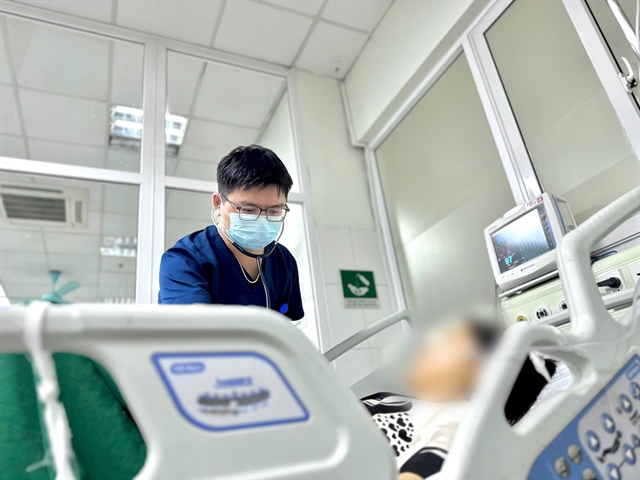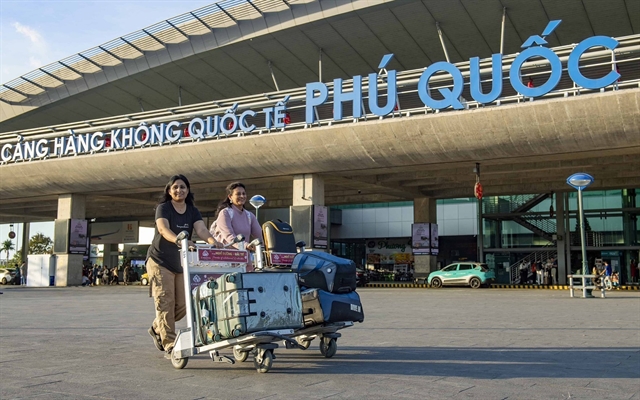 Society
Society


|
| A doctor treats a malaria patient at the National Hospital for Tropical Diseases in Hà Nội.—Photo baochinhphu.vn |
HÀ NỘI — The National Hospital for Tropical Diseases in Hà Nội has reported a series of severe malaria cases over the past week, all linked to individuals returning from African countries.
One of the cases is L.T.M., 33, from the northern province of Lào Cai Province, who had returned from a trip to Africa three months ago.
Upon her return to Việt Nam, she developed a persistent high fever of 40 degrees Celsius, along with headache, nausea, fatigue and pale skin.
Despite over a month of treatment at other hospitals, where she was misdiagnosed with haemophagocytic syndrome, her condition deteriorated.
The fever continued, and she suffered a reduction in all three blood cell lines (red cells, white cells and platelets) as well as seizures and impaired consciousness.
The patient was subsequently transferred to the National Hospital for Tropical Diseases in Hà Nội.
Nguyễn Đức Minh, a doctor from the hospital's Emergency Department said the patient was admitted in a coma with continuous high fever.
Blood tests confirmed infection with Plasmodium falciparum, the most common and deadly malaria parasite, with an extremely high parasitic load of 1.9 million parasites per cubic millimetre of blood.
“This is a case of severe cerebral malaria with a very high risk of mortality,” he said.
Following diagnosis, she received intensive care, including anti-cerebral oedema treatment and both oral and intravenous antimalarial medication.
She has shown positive signs of recovery, with gradual improvement in consciousness.
However, while her blood markers have improved, they remain outside the normal range, and close monitoring and further treatment will be required.
Another patient, N.V.K., 45, from Hưng Yên Province, had been working in Africa as a worker.
After returning to Việt Nam, he began experiencing intermittent high fevers, peaking at 39 degrees Celsius, chills and pain in the right upper abdomen, fatigue and loss of appetite.
At a local hospital, he was diagnosed with septic shock, multiple organ failure and acute liver damage.
His condition continued to worsen with severe diarrhoea, prompting a transfer to the National Hospital for Tropical Diseases.
Upon admission to the Intensive Care Unit, K. was found to have abdominal distension, pain in the right upper quadrant, jaundice, chills and signs of multiple organ failure. He required oxygen support.
Blood tests confirmed severe malaria caused by Plasmodium falciparum, with a parasitic density of 48,000 parasites per cubic millimetre of blood.
Trần Thị Nhung from the Intensive Care Unit stated after more than a week of intensive antimalarial treatment, the patient tested negative for the malaria parasite, overcame septic shock and has now fully recovered. He has been discharged from hospital.
The third case is V.T.P., 38, from Hải Phòng City, who had recently returned from Nigeria.
She developed fever and fatigue immediately upon her return.
Her family found her in a state of coma and rushed her to hospital.
Due to her critical condition, she was intubated and quickly transferred to the tropical diseases hospital.
There, she was diagnosed with cerebral malaria, multiple organ failure and septic shock, all of which carried a very high risk of death.
Doctor Minh of the hospital said malaria is an infectious disease caused by Plasmodium parasites and transmitted by Anopheles mosquitoes, commonly found in tropical countries.
Typical symptoms include a three-phase fever pattern of high temperature, chills and sweating.
However, if travel history and clinical presentation are not thoroughly assessed, the disease can easily be misdiagnosed, particularly in severe cases involving shock, organ failure or neurological symptoms.
“Delayed treatment significantly increases the risk of death,” he added.
Anyone experiencing acute fever after returning from abroad, especially from African countries, should immediately visit a specialised hospital for prompt testing and diagnosis.
Travellers heading to high-risk areas should seek pre-travel medical advice and consider prophylactic antimalarial medication to prevent infection and avoid life-threatening complications, he said. — VNS




